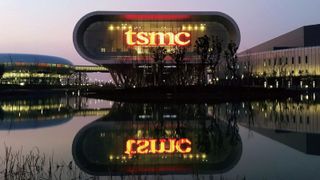TSMC is in a heated tussle with a golf course to build the most advanced 2nm chip plant on the planet
The Central Taiwan Science Park has issued an ultimatum to the golf club: resolve your issues by December 15 or face compulsory acquisition.

The Central Taiwan Science Park (CTSP) in Taichung, Taiwan is pushing forward with its second phase expansion which will house TSMC’s most advanced fab yet. CTSP said that over 95% of the land required for expansion has already been agreed for purchase, including the Hsing Nong Golf Course. But according to United Daily News (machine translated), the golf course’s club members are blocking the acquisition because they demand a buyback price for each gold certificate of $1.8 million New Taiwan dollars (NT) —approximately $56,000 US.
This amount is based on 80% of the average NT $2.2-million price of one golf share for a course based in Central Taiwan over the past two years. Given that the Hsing Nong Golf Course issued 1,750 certificates, that amounts to a total of NT $3.15 billion or over US $98.5 million. The current average price of a single golf certificate in central Taiwan has already exceeded NT $3 million (around US $94,000). Nevertheless, the Hsing Nong Golf Course expects to net between NT $15 and $20 billion (US $470 to $626 million) from the sale, even after paying the members’ asking price.
Despite getting a bargain, it seems that the Hsing Nong Golf Course has been avoiding coordinating with its members, thus they are considering filing lawsuits and mounting a protest. This news has led to CTSP’s concern that its land acquisition plans would be jeopardized by years of lawsuits and countersuits. So, it issued a final ultimatum to the golf course owners: resolve the issue with its members by December 15 or face compulsory acquisition, likely through eminent domain.
If all goes to plan, the CTSP administration expects to complete all land acquisition for its second phase by the end of 2024. It will then hand over a large parcel to TSMC in 1Q25 so that it can start construction on its most advanced fab ever, which will produce 2nm chips. While we don’t know yet who TSMC’s potential customers for 2nm chips are, we should note that OpenAI has recently abandoned plans to build its own factories and is relying on Broadcom and TSMC to make chips for it. And even as TSMC’s U.S. fabs are starting production and could even hit higher yield than comparable Taiwanese fabs, it seems that the company wants to see the latest and greatest technologies at home.
Stay On the Cutting Edge: Get the Tom's Hardware Newsletter
Get Tom's Hardware's best news and in-depth reviews, straight to your inbox.

Jowi Morales is a tech enthusiast with years of experience working in the industry. He’s been writing with several tech publications since 2021, where he’s been interested in tech hardware and consumer electronics.
Most Popular





